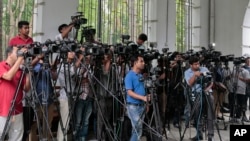A Bangladeshi journalists trade organization is expressing outrage over the recent detention and one-year sentencing of Bangla Tribune correspondent Ariful Islam.
According to local news media reports, Ariful was arrested at home on narcotics charges in the early hours of March 14 and immediately sentenced by a mobile court empowered by the Kurigram administration taskforce.
The Dhaka-based Sampadak Parishad (Editors' Council) issued a statement calling the drug charges part of a politically motivated campaign to silence Ariful for his work as a journalist.
The council pressed for Ariful's immediate release and for the resignation of, and departmental action against, Kurigram Deputy Commissioner Sultana Pervin, who was involved in directing the arrest.
The Dhaka High Court on Sunday responded to demands of Ariful's employer by granting the reporter bail and calling upon Kurigram officials to provide all relevant documents regarding Islam's charges and sentencing. The court also called for all documents supporting the creation of the Kurigram district task force and mobile court.
Debashish Bhattcharyya, the Kurigram district deputy attorney general, defended the taskforce, insisting that Ariful's arrest followed standard mobile court procedures.
Released on bail Sunday afternoon, Ariful was taken to Kurigram General Hospital, where he recounted hours of grueling torture to fellow reporters.
“They blindfolded me and tied up my hands and feet before shoving me into a car,” Ariful was quoted as telling reporters from the Dhaka Tribune at his bedside. "They proceeded to take me to an isolated place and Nazim kept saying 'Say your prayers now, you are about to meet your maker.’
"I begged them to spare my life," he added. "I desperately told them that I have two children and my parents have passed away. Don't kill me or my children will become orphans too.”
Kurigram General physicians confirmed the presence of injuries to Ariful's body, "especially on his hands, legs, back and head."
Ariful's arrest triggered demonstrations across Bangladesh, where reports of intimidation, physical attacks, abuse and torture of journalists are on the rise.
This weekend's controversial arrest comes amid the recent disappearance of Dhaka-based photojournalist Shafiqul Islam Kajol, who is also the editor of biweekly Pakkhakal magazine.
Kajol's family on Friday filed a police report stating he had not been seen since March 10, just one day after the journalist, along with 31 colleagues, had been named in a criminal defamation complaint filed by Saifuzzaman Shikhor, a member of parliament's ruling Awami League.
The complaint was filed under Dhaka's "Digital Security Act," a piece of legislation the New York-based Committee to Protect Journalists (CPJ) had previously flagged for creating "extensive legal dangers for journalists carrying out their professional activities.”
“The disappearance of journalist Shafiqul Islam Kajol is especially concerning after he was named in a dubious defamation complaint filed by a member of parliament under the draconian Digital Security Act,” said Steven Butler, CPJ’s Asia program coordinator. “Police need to find Kajol quickly and return him to his family and ensure that a criminal defamation case does not proceed against him or any other journalist.”
Sampadak Parishad has also demanded withdrawal of the defamation complaint.
Ariful's case is scheduled to go before Dhaka's High Court for hearing on March 23.
The Paris-based Reporters Without Borders ranks Bangladesh 150 out of 180 countries in its 2019 World Press Freedom Index, a 4-point drop from its 2018 ranking.
Bangladesh Journalists Up in Arms Over Controversial Arrest
- By Pete Cobus




